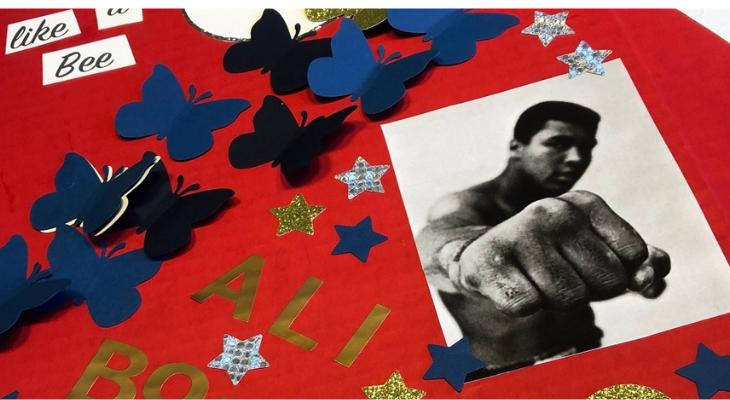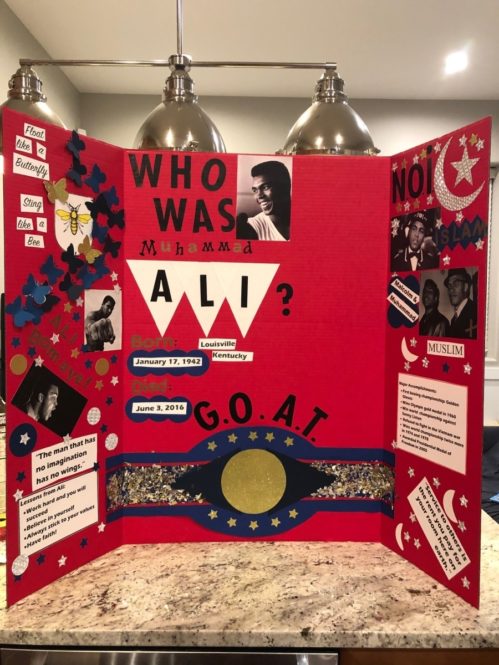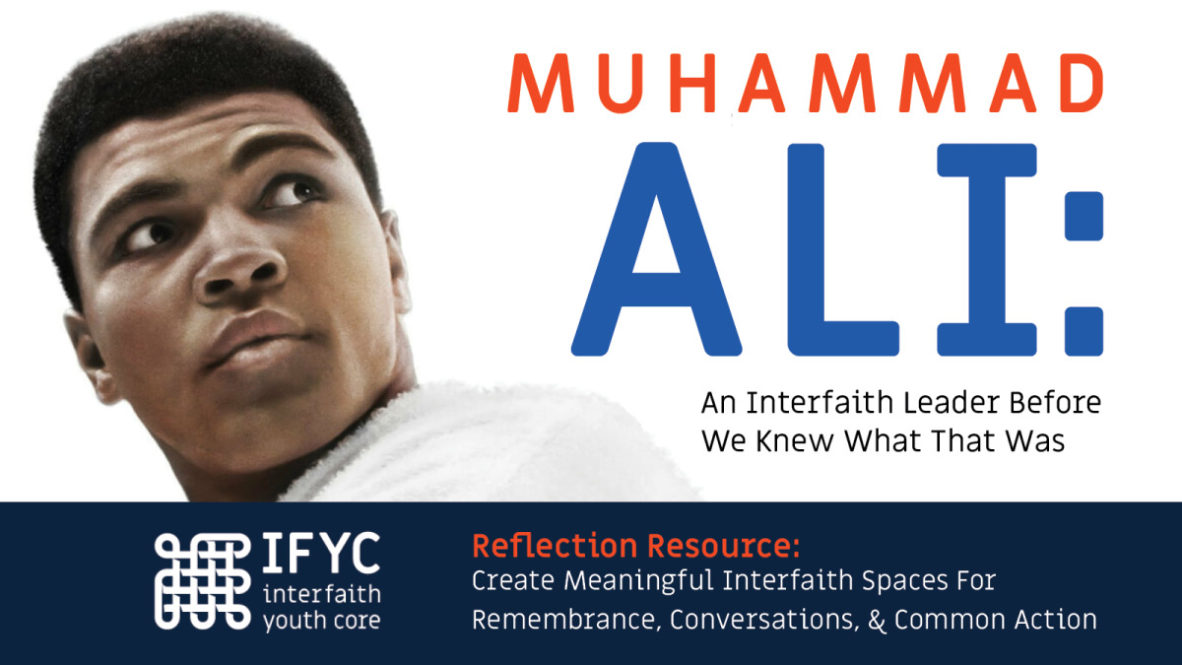My Son and Muhammad Ali: Life Lessons from The Greatest
February 14, 2022

This article was originally posted on October 28, 2021.
“Mama, I picked Muhammad Ali! Because he’s Muslim like us!”
It was the fall of 2019, and my son Sulayman came home bursting with excitement that he had picked Muhammad Ali for his 3rd grade book project. The Chicago teacher’s strike was looming – we knew our lives would be disrupted soon, but we didn’t have a clue about the upcoming pandemic that would keep us homebound just a few months later.
The assignment – read this biography of Muhammad Ali, and do a short presentation to the class along with a poster that represents your learning. Watching the new documentary series, Muhammad Ali, took me back instantly to the moments and conversations I had with Sulayman two years ago. The series showed the many parts of who Muhammad Ali was and how his story continues to shape conversations about leadership, loyalty, and legacy.
As Sulayman worked on his project, we read the biography which covered the basics, but we also added other learning experiences. The mosque where Sulayman went for his Quran lessons, a mere few blocks from our home, was built on land donated by Muhammad Ali. Sulayman and I took detours on our way home from school to drive by the Mosque Maryam, the headquarters of the Nation of Islam. We spent time looking at YouTube videos of old boxing matches and testimonies from Ali’s interfaith funeral service. Soon the two weeklong Chicago teacher’s strike was upon us, and with more time on our hands, Sulayman got to work. In addition to picking out his favorite quotes and pictures of Ali, he also identified four lessons he had learned from Ali’s life. As I reflect on the last two years, I realize that these lessons from my then 8-year-old are still salient for us, for me:
Work hard and you will succeed. As Sulayman worked on his report and presentation, he was also struggling at school and at home. We were exploring a possible ADHD diagnosis for Sulayman, and things only got worse as the pandemic began and we switched to remote school. These last 18 months have tested the mettle Sulayman and I were both made of. We’ve had hard days with many challenges, huge failures with small victories. When he came home with an “A” for his presentation and poster, he was thrilled, but that wasn’t the most important part for him. For Sulayman, it was the poster itself, one that he has spent countless hours putting together, which he saved and still pulls out for inspiration when he needs to remember what gifts he is capable of.
Share
Related Articles
American Civic Life
The Interfaith Legacy of Muhammad Ali: “The Wise Man Changes”
American Civic Life
Eboo Patel and Wajahat Ali: Is “Interfaith America” Even Possible?
American Civic Life

Sulayman’s 3rd grade project on Ali. The quotation on the left reads, “The man that has no imagination has no wings.”
Believe in yourself. Living life through this pandemic brought all the expected challenges – managing homeschooling for three kids, adjusting to work remotely, caring for parents with a high risk for COVID. We were all faced with the impossible, and yet we have survived, and we are beginning to thrive again. I have faced agonizing moments of uncertainty in these difficult 18 months, questioning my worth, questioning my ability to be a good mother, a productive colleague, a valuable community member. I still have those moments, and when I do, my son reminds me to believe in myself – a lesson he learned from Ali.
Always stick to your values. After refusing to go to Vietnam, Ali was convicted of draft evasion, fined $10,000, and banned from boxing for three years. For some of that time, he sought refuge in Chicago, in these same South Side streets I call home. Years later, Ali would return to build Masjid al-Fatir, a mosque with a beautiful gold dome standing tall on the corner of 47th and Woodlawn. I have a complicated relationship with this mosque, as I disagree with many of the teachings it advocates, especially with regards to women and policies that restrict women’s access the main prayer sanctuary. As a result, I don’t worship at Masjid al-Fatir, but I respect those in my community who chose to engage and call it their spiritual home. And for a while in pre-pandemic times, my children attended Quran classes there. Ali’s story teaches me that it’s possible to sit with complexity while staying true to our values – it’s possible to disagree and still be in community with one another.
Have Faith! For my son, a now 10-year-old boy of mixed race living on the south side of Chicago, Muhammad Ali’s story carved a path of identity and belonging, of possibility and promise. Through engaging his story, we had an opportunity to sit with the complexities of race, religion, and community in these last two years – through the pandemic, through the aftermath of George Floyd’s murder. Ali’s story gave me and Sulayman the inspiration we needed to survive some of the hardest challenges we’ve faced as a family. And we have faith that we’ll be able to do again.
We live in a time of great challenges, and we need inspiration from our heroes, not because they are perfect, but because they strived to be true to what they believed and responded to the challenges of their own time. I’m grateful that Muhammad Ali continues to inspire my son, my country, and me.




